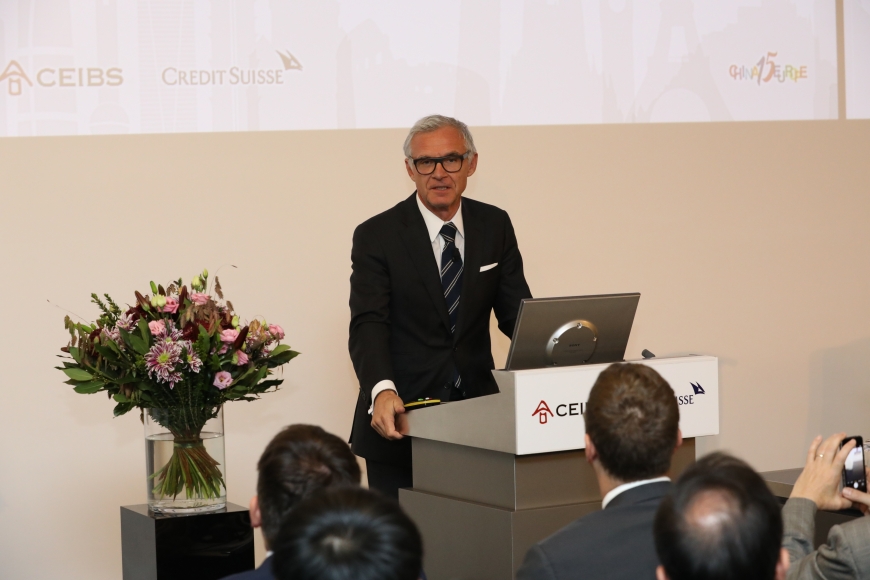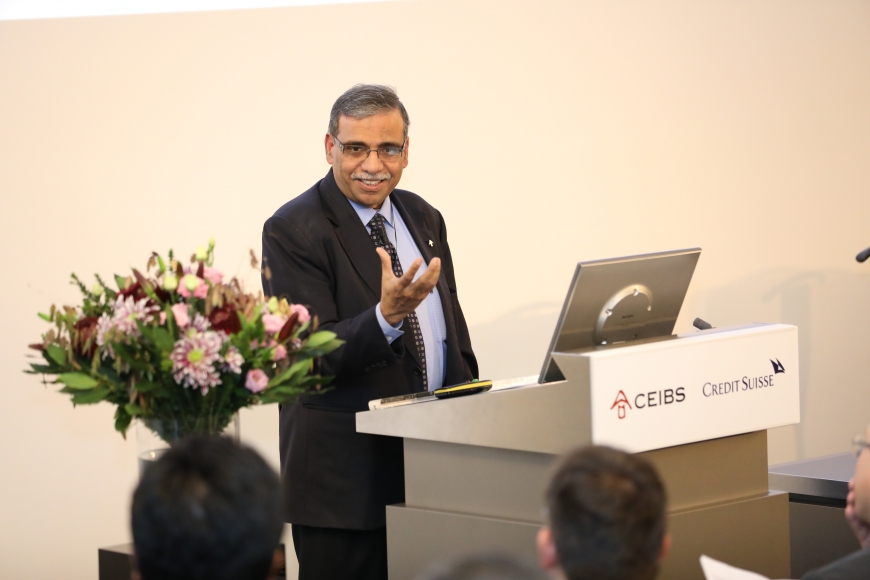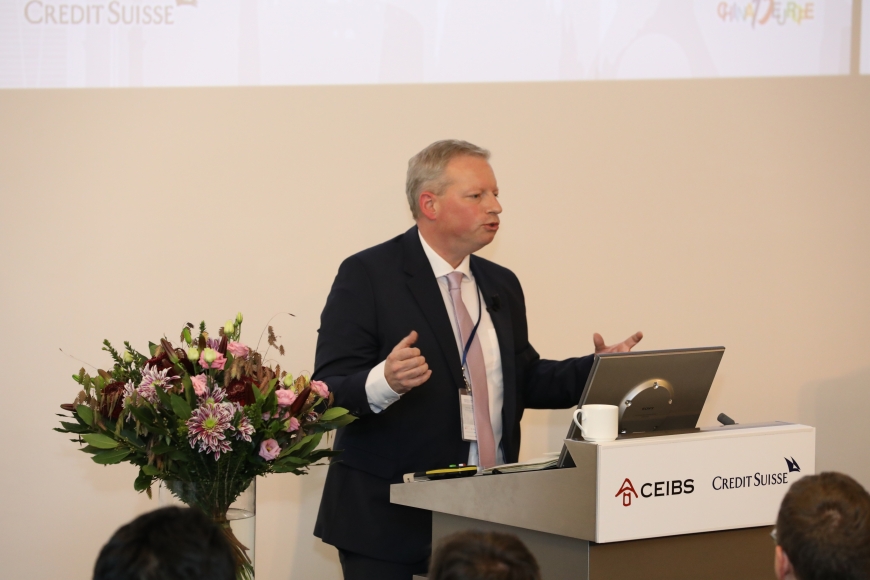CEIBS Forum Explores Smart Healthcare: The China-Swiss Connection
October 24, 2018. Zurich – About 200 players from the Chinese and Swiss healthcare industries gathered today to discuss innovations in smart healthcare products and services in China, how to leverage smart healthcare technology as a way to reshape the industry in both countries and how both sides can work together in the field. They were attending the Zurich leg of the 4th Europe Forum series being co-hosted by China’s leading international business school, CEIBS and Credit Suisse. Today’s event explored the broad theme of “Smart Healthcare: Reshaping the Healthcare Industry in China and Switzerland”.
Faced with an ageing population, China’s local governments have placed healthcare, in addition to technological innovation, at the top of their agenda in order to improve the quality of development. With an efficient medical service system and a well-established aging care industry, Switzerland has long been at the forefront of the global healthcare industry. Today’s discussions touched on the latest developments in smart healthcare within both countries, how they can complement each other to kick-start product and service innovation in the industry, all while working together for its advancement through mutual investment and technological cooperation.
In his opening address, H.E. Qinghua Zhao, Consul General, the People’s Republic of China in Zurich and the Principality of Liechtenstein spoke of the mutually beneficial friendship between both countries, and how it has extended to the field of healthcare. Over the past five years, he noted, high-ranking officials from both sides – headed by Chinese President Xi Jinping and President of the Swiss Confederation – have nurtured the Sino-Swiss relationship into becoming its strongest ever in history. He told the audience that China has a huge stake in, and commitment to, the growing demand in national healthcare while Switzerland has been a global leader in the medical industry. Further development within the two countries represents more mutual benefit and win-win for citizens of both sides, he said, adding his hope that the day’s event would provide insights that would reshape the future of the healthcare industry. “Based on complementary cooperation between us, we hope the companies on both sides will deepen our dialogues for a win-win partnership,” he said.

H.E. Qinghua Zhao, Consul General of the People’s Republic of China in Zurich and the Principality of Liechtenstein delivering his opening remarks
In his speech, Urs Rohner, Chairman of the Board of Directors of Credit Suisse Group AG, spoke of how his company and CEIBS have found avenues of mutually beneficial cooperation, and his company’s role in fostering the wider China-Swiss relationship. “For the last three years, we’ve worked closely with CEIBS, which is newly ranked by the Financial Times as having the #5 EMBA programme worldwide,” he said. “Meanwhile, the relationship between China and Switzerland has a long history. Credit Suisse has been active in China for over 60 years, having begun as a correspondent bank with Bank of China in 1950, and being the first international bank to open a representative office in Beijing 1955. Since 2013 when China and Switzerland signed the free trade agreement, the two countries have taken our strategic dialogue and cooperation to a new level.”

Urs Rohner, Chairman of the Board of Directors of Credit Suisse Group AG
Today’s event is part of CEIBS’ longstanding efforts to provide a platform through which the wider Sino-European ties can be fostered. It is one of five being hosted as part of CEIBS Insights 2018, an initiative launched to mark the 15th anniversary of the China-EU Comprehensive Strategic Partnership. Prior to the Zurich event, CEIBS hosted forums in Paris (October 19), Munich (July 17), London (July 19) and Prague (September 25). As CEIBS Vice President & Dean Professor Ding Yuan explained during his welcome speech, the Zurich forum was yet another example of the school’s commitment to the ideals on which it was founded. “CEIBS is unique in the world for its unprecedented governance structure and its mission. It was initially founded to help the development of China, within China. Given the country’s increasing attractiveness, CEIBS aims to help China in a new way, and also help the world understand China in a new way.” He added that besides the school’s tremendous increase in the level of its diversity and the big leap it had made in the EMBA ranking, CEIBS has more to offer. The forum is part of a wider effort to help strengthen commercial ties in Switzerland and help foreign companies better understand and do business in China. “The total size of China’s consumption market this year is US$5.7 trillion, surpassing that of the US. In 10 years, China will be 1 to 1.5 times bigger than the European market, and a primary growing factor is service,” he pointed out. With a population of over one billion, including a growing middle class and an aging population, he anticipates that China and Switzerland will break new and mutually beneficial ground with innovations in not only finance but also healthcare.

CEIBS Vice President & Dean Professor Ding Yuan
Dean Ding was just one of the members of the school’s leadership team that spoke at the event. In his opening keynote speech, CEIBS President (European) Professor Dipak Jain emphasised that the human touch is indispensable in doing business in the current age where we are seeing a transition from capitalism to entrepreneurism. Today, he said, the players are citizens instead of competing companies, and profit is no longer the barometer of success. He underscored two global trends that are crucial to healthcare: technological convergence and an aging population; and identified three areas of particular significance in the healthcare industry: consumer wellness, which consists of healthcare and wealth care; consumer hospitality, including medical tourism; and consumer engagement, primarily of digital media and entertainment. Professor Jain ended on an inspiring note, with suggestions on how to humanise business in healthcare. The key, he said, is to recognise that people are the only source of differentiation and value creation.

CEIBS President (European) Professor Dipak Jain
Ahead of Prof. Jain, the audience heard from Mr. Chris Ebell, Principal and Owner, Verticai Consulting and Ventures who is also COO, ParTec GmbH. He noted that a mushrooming of brave initiatives around the world, epitomised by the human brain project of the European Commission with 19 member states, has been behind the core technical research within the global health industry. He identified four driving forces behind the industry, and underscored the importance of solid understanding and regulation of AI in this field. He stressed that the multi-level operation of smart healthcare connected to AI, global policies, and the economy made for a very dynamic industry. “Opportunities are tremendous, and one of the big challenges is to make sense of what is happening in this field, and find a way to implement what has been achieved in research.”

Mr. Chris Ebell, Principal and Owner of Verticai Consulting and Ventures
The day’s first discussion focused on “Healthcare Product Innovation Boosted by Smart Healthcare Technology”. The stage was set with three keynote speeches. The first was by Prof. Christopher L. Tucci, Chair in Corporate Strategy & Innovation and Former Dean, College of Management of Technology, EPFL who is also CEIBS Visiting Thought Leader. He touched on the issue of product innovation, emphasising that digital innovation, coupled with AI and block chain, is the key for the future of the healthcare industry. “There’s no fine line between product and service innovation, it’s always a combination,” he said, adding that this makes cost-cutting based on AI particularly important. For example, medical diagnosis increasingly hinges upon crowd sourcing.

Prof. Christopher L. Tucci, Chair in Corporate Strategy & Innovation and Former Dean, College of Management of Technology, EPFL
He was followed by Mr. Jun Wang, Founder and CEO, iCarbonX, who is also Board Member and Former CEO of BGI and former President of BGI Research. He focused on the issue of uniqueness in providing solutions in healthcare. He believes there is no one-size-fits-all technology that can fit the unique nature of persons demanding unique solutions. He anticipates the emergence of an underlying trend where all the data from one’s digitalised and computerised life will be available and the healthcare industry will benefit from using a personalised approach to leveraging this data.

Mr. Jun Wang, Founder and CEO, iCarbonX
The third keynote speaker was Dr. Dr. Matthias Reumann, Sustainable, Resilient Health Systems Researcher at IBM Research (Zurich). In sharing his views on how AI will impact the field of medicine, he stressed that the human touch would actually be enhanced, not replaced. While he echoed previous speakers’ comments that computing power is the cornerstone of smart healthcare, Dr. Matthias stressed that ‘clean’ data is the key to get better results, which demands that we strip the data of bias so it can be used to predict and treat rare diseases.

Dr. Dr. Matthias Reumann, Sustainable, Resilient Health Systems Researcher at IBM Research (Zurich)
All three speakers were joined by two other participants for the panel discussion that followed. During his contribution to the dialogue, Mr. Thomas Amrein, Vice President and Senior Portfolio Manager of Global Equities, Credit Suisse noted that the biggest problem in smart healthcare is resistance to change. He made the point that since any meaningful and fundamental changes in the field would take a long time to implement, and clearly there would be losers in the process, an incentive system may be an efficient driver behind the transformation of the healthcare industry. Meanwhile the significance of prevention and ethical issues in terms of data privacy were among the main points raised by Mr. Sijia Lu, CEO, Yikon Genomics, “In healthcare, prevention is more important than cure,” he said.

First panel discussion
The day’s second session centred on “Healthcare Service Innovation Driven by Smart Healthcare Technology” and also followed the same format of opening keynote speeches followed by a panel discussion. In his keynote address, Mr. Guillaume DuPasquier, Co-Founder, DomoSafety drew participants’ attention to the challenges of AI in medical use from a policy perspective. He stressed that the pressing question was how to trust information that we do not have adequate perspective to fully understand. The role of Internet 2.0 in healthcare was the focus of the keynote by Mr. Benjamin Huang, Group Deputy CTO and CTO of Healthcare Plate Tech+ Department at Fosun Group. “The Internet has restructured the patient-doctor relationship and the hospital system,” he told the audience. “We see limited medical resources and lack of skills among frontline medical practitioners, in addition to the unbalanced landscape of medical service across the country. AI thus has a major role to play in health management, to leverage data in a secure and decent way, whereas blockchain may lay the foundation for solutions of this kind.”

Mr. Guillaume DuPasquier, Co-Founder, DomoSafety

Mr. Benjamin Huang, Group Deputy CTO and CTO of Healthcare Plate Tech+ Department at Fosun Group
In addition to the two speakers, the day’s last panel discussion also saw input from Mr. Liang Liang, Founder and CEO, Easyhin and Mr. Dominik Mayer, Principal, AO Invest.
They both echoed Huang’s comments on Internet 2.0 as the new interface for incorporating online materials with offline context. Liang also stressed that a shared economy was taking shape to join the experiment of smart healthcare where medical resources could be matched and coordinated in a sustainable fashion, so as to upgrade the medical service both in quality as well as scale. “AI can replace the more mechanical and routine aspects of medical treatment. As more structured data is harnessed, specific algorithms will emerge for particular illnesses. More formerly-marginalised problems will therefore enter centre stage as more mature technologies come about,” he said.

Second panel discussion
The half-day forum ended with a closing address by CEIBS Honorary President (European) Pedro Nueno who said it sometimes takes four to five years, from the moment a doctor spots a problem to the moment a patient was cured. “The patients couldn’t wait. So they go fast,” he added. He emphasised that the aging population and multiplying medical issues have created a need for more individual models and better trained doctors.

CEIBS Honorary President (European) Pedro Nueno
The Zurich forum brings to a close CEIBS 4th Europe Forum 2018, with plans for next year’s events, when the school celebrates its 25th anniversary, already underway.
About CEIBS
China Europe International Business School (CEIBS) is among the top international business schools in Asia, and only school with two programmes (MBA at #8 and Global EMBA at #5) simultaneously ranked among the FT’s top 10 in 2018.
With more than 20,000 alumni from more than 80 countries worldwide, CEIBS has provided a broad range of management programmes for more than 150,000 executives both at home and abroad. CEIBS’ faculty team is uniquely equipped to deliver a combination of China Depth and Global Breadth in both teaching and research.
CEIBS has campuses in Shanghai, Beijing, Shenzhen, Zurich, and Accra.
















